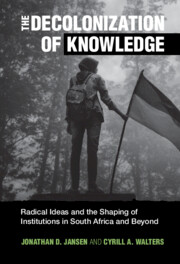Crossref Citations
This Book has been
cited by the following publications. This list is generated based on data provided by Crossref.
Jansen, Jonathan
2022.
Are South African universities disengaged from civic duty?.
South African Journal of Science,
Vol. 118,
Issue. 1/2,
Jansen, Jonathan D.
2023.
The Politics of Knowledge in the Biomedical Sciences.
p.
251.
Roy, Srila
2023.
Dissonant intimacies: Coloniality and the failures of South–South collaboration.
The Sociological Review,
Vol. 71,
Issue. 6,
p.
1237.
Jansen, Jonathan
and
Walters, Cyrill
2023.
The Politics of Knowledge in the Biomedical Sciences.
p.
95.
Matahela, Vhothusa Edward
and
van Rensburg, Gisela Hildegard
2023.
Towards Decolonizing the Self: Nurse Educators’ Engagement in Personal Mastery.
Creative Nursing,
Vol. 29,
Issue. 2,
p.
197.
Dullaart, Gerda
Coetsee, Ydalene
Farmer, Jean L.
Feldman, Jennifer
Joorst, Jerome
Loots, Ruenda
McKay, Marianne
and
Ntwasa, Simbongile
2023.
Challenges of transforming curricula: Reflections by an interdisciplinary Community of Practice.
Transformation in Higher Education,
Vol. 8,
Issue. ,
Ndlovu-Gatsheni, Sabelo J.
2023.
Ten challenges in reconfiguring African Studies.
Review of African Political Economy,
p.
1.
Luckett, Kathy
2023.
Reflections from South Africa on Language, Culture and Decolonisation.
South African Journal of Science,
Vol. 119,
Issue. 3/4,
Walker, Melanie
Boni, Alejandra
and
Velasco, Diana
2023.
Reparative Futures and Transformative Learning Spaces.
p.
1.
Simmonds, Shan
2024.
Critical Reflections on Teacher Education in South Africa.
p.
17.
Ndlovu-Gatsheni, Sabelo J.
2024.
Ten challenges in reconfiguring African Studies.
Review of African Political Economy,
Vol. 51,
Issue. 179,
Fregoso Bailón, Raul Olmo
Jupp, James C.
and
Garza, Raul
2024.
Itinerant curriculum theory from the Global South: a new grammar curriculum from México Profundo/Gran México.
Journal of Curriculum Studies,
p.
1.
Pietersen, Doniwen
and
Langeveldt, Dean Collin
2024.
Challenging violence in South African education: a feminist pedagogical and legal analysis.
Curriculum Perspectives,
Walker, Melanie
2024.
A capabilitarian approach to decolonising curriculum.
Education, Citizenship and Social Justice,
Vol. 19,
Issue. 1,
p.
110.
Zewde, Almaz
2024.
De-neocolonizing Africa.
p.
95.
Savitri, Eva
Hidayani, Laili
Srimaryani
and
Abduh, Nurul Khairani
2024.
Critical reflections on teacher education in South Africa.
African Identities,
p.
1.
Simba, Precious
Walters, Cyrill
and
Jansen, Jonathan D.
2024.
Academic Xenophobia.
p.
53.
Bawack, Ransome
2024.
Electronic commerce for development: a conceptual analysis and future research agenda for Africa.
Information Technology for Development,
p.
1.
Simba, Precious
Walters, Cyrill
and
Jansen, Jonathan D.
2024.
Academic Xenophobia.
p.
1.
Simmonds, Shan
2024.
Challenging dominant education paradigms: posthuman feminist inspirations towards alternate pathways for decolonising the curriculum.
Curriculum Perspectives,



